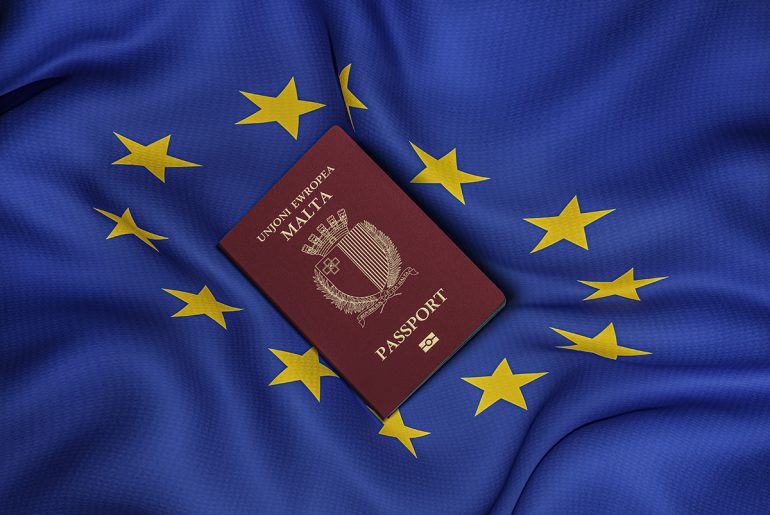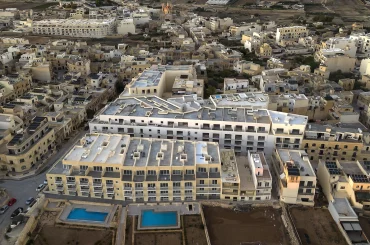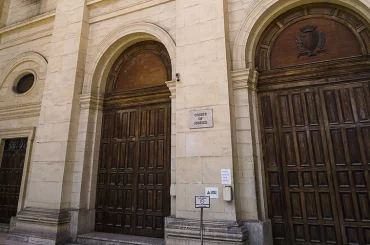The EU Commission’s escalation of legal action against Malta’s sale-of-passports scheme last week comes in the midst of momentous political developments that add much weight to otherwise innovative legal arguments, this website can report.
The timing suggests that the EU believes that now is the time to wear down Malta’s intransigence in the long-running controversy over passport sales. With Malta now isolated over the matter, the commission may calculate that Malta would relent under political pressure.
Political pressure is part of the balance because, in the words of EU constitutional law expert Matteo Bonelli, the commission’s legal case relies on “rather creative and novel legal arguments” and that this case, if it eventually goes to the European Court of Justice (ECJ), would be “a controversial and difficult case”.
He added that the case “is in itself unusual in ‘infringement’ cases where the Commission most of the times relies on well-established EU law doctrines (and in fact wins a high majority of the cases). Here EU law and the Court’s case law are not yet perfectly clear and would have to be tested in the possible decision on the infringement [court] action.”

Bonelli, an associate professor at the University of Maastricht who has published many papers into EU constitutional and institutional law in recent years, was answering questions by this website following the EU Commission’s ‘reasoned opinion’, the last step before court action.
Bonelli also dismissed Malta’s stock defence that the granting of citizenship is purely a matter for individual countries.
The scheme opens the door to corruption, money laundering and tax avoidance.
EU Commissioner for Justice
“It is true that acquisition and loss of nationality and citizenship rules are a national competence, but Member States must still respect EU law obligations when they exercise that competence,” Bonelli said.
Granting Maltese citizenship also bestows EU citizenship and – as Bonelli put it – “as we say in technical terms, Member States must have due regard to EU law. That means that the Maltese government cannot ’simply’ reply that the granting of citizenship is and should remain a national competence. It will have to show that there is no EU law rule or obligation that prevents the granting of citizenship by investment schemes.”

The kinetics triggered by the EU Commission’s reasoned opinion will determine whether the commission will escalate to court action. Malta has two months to file a formal reply, although the case could be settled if EU and Malta forge a compromise, or if Malta gives in.
Malta is the last holdout
The Commission initially threw a legal challenge over investor citizenship schemes (as the sale-of-passports schemes are known) to Malta and Cyprus on 20 October 2020. Cyprus repealed its scheme less than two weeks later. The Commission also entered into discussions with Bulgaria over a similar scheme, which led to Bulgaria repealing its scheme two weeks ago, on 24 March.
Four days later the EU Commission “stressed” – indirectly addressing Malta – that “any Member State still operating investor citizenship schemes needs to terminate them immediately.”
But Malta remained intransigent, and a week later the Commission moved with the ‘reasoned opinion’.
In Malta’s scheme, an applicant can pay €600,000 into a “national development fund” to get a passport after two years on a residence permit, or shorten the period to 1 year if payment rises to €750,000. The applicant would also have to buy property that costs at least €700,000, or rent a place that costs at least €16,000 annually, and donate €10,000 to a Maltese NGO. Although applicants would technically be residents of Malta in the year or two leading up to procuring citizenship, no one checks if they reside in Malta at all.
Opposition to the citizenship scheme has ranged from opposition to the idea of reducing citizenship to a commodity to concern over money laundering risks.
In calling for termination of citizenship schemes on 28 March, the EU Commissioner for Justice and Consumers, Didier Reynders, said: “European values are not for sale. We consider that the sale of citizenship through ‘golden passports' is illegal under EU law and poses serious risks to our security. It opens the door to corruption, money laundering and tax avoidance.”

Fellow Commissioner for Home Affairs, Ylva Johansson, added that “now more than ever, in the face of war, we must do everything to ensure that Russians and Belarusians under sanctions and those supporting Putin's war of aggression cannot buy their way into the EU.”
Malta has since said it will not be accepting applications by Russians and Belarusians.
Legal case less straightforward
In the so-called ‘reasoned opinion’, the Commission invoked two points to argue that Malta’s investor citizenship scheme infringes EU law.
One of those, in the Treaty on Functioning of the European Union, establishes that citizenship of any country within the EU also confers EU citizenship rights – freedom of movement, the right to stand in elections of the European Parliament and vote in those elections and in local elections, and the right to petition the EU Commission and expect a reply.
Moreover, an EU citizen has the right to diplomatic and consular protection by the embassy of any EU country in any third country where the country that bestowed him citizenship does not have an embassy. This is particularly relevant in Malta’s scenario because Malta has a limited number of embassies around the world.
In the second point, the Commission is arguing that investor citizenship schemes are in breach of the concept of “sincere cooperation” in the EU Treaty. This point is probably developed into the legal argument that granting citizenship as a commodity, with the grantees having no genuine link to Malta, jeopardises “the attainment of the Union’s objectives” and somehow jars with the idea that EU countries “shall take any appropriate measure, general or particular, to ensure fulfilment of the obligations arising out of the Treaties or resulting from the acts of the institutions of the Union.”
I write ‘probably’ in the paragraph above because, as Matteo Bonelli put it, “the reasoned opinion is confidential so we don’t know how the Commission develops these two arguments, so it hard to assess to what extent they are solid.”
In any case, basing the arguments on the principle of sincere cooperation and the essence of EU citizenship, is “rather creative and novel legal arguments” and it would not be “the typical straightforward infringement case.”
Bonelli also said that the real question that would have to be settled in court would not be whether granting citizenship is a national or EU competence – Malta’s defence to this effect is simplistic, and a non-starter – the question would be “whether there is any EU rule that prevents the granting of citizenship by investment schemes.”
“Basically,” he added, “the Commission will have to convince the Court to develop its case law much further than what it has done until today.”
This is how EU constitutionalism develops, case by case, because the treaties themselves are merely the bare bones of the EU’s constitutional law that are then fleshed out in caselaw.

Yet irrespective of any legal arguments, perhaps more potent at this stage is the political pressure bearing on Malta to end its citizenship investor scheme. A month ago, the European Parliament voted overwhelmingly – 595 to 12 (with 74 abstentions) – to ban such citizenship schemes. This prompted Bulgaria to repeal its scheme.
Malta now stands alone.
This article is the first of a series of four articles into Malta's citizenship and residence schemes, which have courted much controversy. The second article delves into the nomad residence scheme, which opens the door to tax avoidance, while the third charts the permanent residence scheme, granted to a number of wealthy non-EU nationals larger than the population of the capital Valletta.





